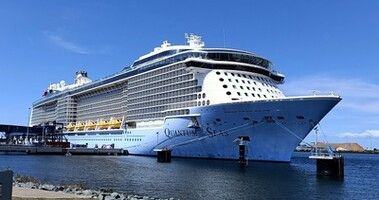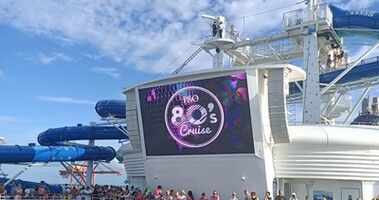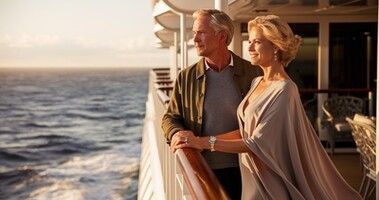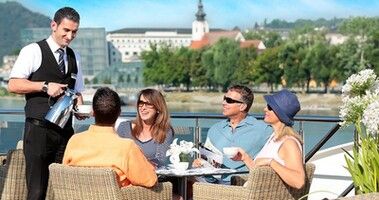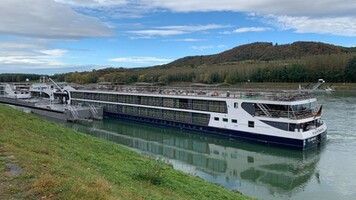
Where do Mediterranean Cruises go?
Mediterranean Cruises fall into 3 main regions:
- Western or Central Mediterranean: Ports including Barcelona, Marseilles, Genoa, Livorno, Rome and Valletta.
- Eastern Mediterranean: Ports including Venice, Split, Dubrovnik, Kotor and Athens.
- Southern Mediterranean: Ports including Athens, the Greek Islands, Kusadasi, Istanbul, Crete, Rhodes and Limassol.
 Barcelona, Spain |  Kotor, Montenegro |  Dubrovnik, Croatia |  Rome, Italy |
First-time cruisers are most likely to select a Western Mediterranean cruise that includes familiar destinations such as Rome, the French Riviera and Barcelona. Seasoned European travellers are likely to select a cruise that goes to destinations they haven't been or a 'bucket list' destination, such as those found on an Eastern or Southern Mediterranean cruise.
How long are Mediterranean cruises?
Most Mediterranean itineraries range from 7 to 14 nights.
If you're going to spend the money and time to fly from Australia, then you may want to consider a longer cruise that allows you to experience more destinations.
While a shorter cruise may seem cheaper, calculate the daily cost and compare it to the same experience on land. Onboard, you have your accommodation included, transport between destinations, all meals, entertainment, with everything in the one spot. There is no packing up and unpacking between destinations, no lugging your suitcase over cobblestone streets, and you get to visit a new place every day or two.
Which cruise line should I pick?
Not all cruise lines are the same. They all specialise in specific customer experiences and routes.
It is important that you select a cruise line that aligns with your vision of what you want to experience. Here are some great questions to consider to help make this decision.
- Are you travelling with children? If so, the kids will likely want a lot of 'fun' onboard activities and experiences such as kids clubs, rock climbing, water slides, and dodgem cars. Cruise lines to consider include Royal Caribbean, Norwegian Cruise Lines and MSC Cruises. These cruise lines also attract a lot of couples, friends and solo travellers who are looking for entertainment onboard, great cuisine, and an opportunity to mingle with like-minded travellers.
- Are you looking for a destination focussed or culturally immersive cruise experience where you can catch up with fellow travellers at the end of the day and compare notes? Cruise lines such as Azamara, Celestyal, Oceania, Viking and Windstar all offer smaller ships that can access ports the larger vessels can't and often include overnight stays or late departures, allowing you extra time in port to sample the local culture and cuisine.
- As well as the above, perhaps you're seeking an ultra-luxury all-inclusive small ship cruise experience with Regent Seven Seas Cruises, Seabourn, or Silversea. These cruise lines offer hand-crafted port visits that might involve joining the onboard chef at local markets to select items for the evening's meal or a locally-inspired menu with paired wines.
- If you hold loyalty membership with one cruise line and you are considering an itinerary that is offered by another cruise line, check if they offer a status match program. In this way, whatever benefits you get may be matched.
 MSC Cruises |  Oceania Cruises |  Norwegian Cruise Lines |  Viking Cruises |
Pre & Post Cruise Stay
I always advise my clients to arrive a few days before the cruise so that you have time to recover from the long flight. It also allows you time to explore the place before you board the ship. Another bonus of doing this is that it ensures that if there are flight delays, you don't miss your ship!
Some cruise lines offer flexible embarkation ports, provided the length of the itinerary remains the same. You could save money on airfares by flying into a different port.
If you're sailing one-way, for example, from Rome to Barcelona, be sure to book a post-cruise stay so you don't miss out on the sights at the disembarkation port. Otherwise, you will only see the place in the cab on the way to the airport!
When to go
Avoid Summer! July and August are peak season. It's hot and humid. It's also the school holiday season, meaning a lot of Northern Hemisphere families are travelling and the ships are often filled to capacity. It is also the most expensive time to travel.
Try cruising in the shoulder seasons: May-June or September-October. It will be cooler, less crowded and less expensive.
What to Pack
Light cotton tops and loose-fitting clothes for the warmer weather, a jacket or jumper for cooler days, a pair of good jeans or slacks, good walking shoes, an umbrella or raincoat, and something appropriate for evenings onboard your ship. You'll also want to pack your swimmers, sunglasses, a hat, reef-safe sunscreen, sandals or casual footwear, a good book (whether electronic version or hardcopy), a set of playing cards, USB power cables, power adapters, and your passport!
Action vs. Relaxation
Allow time to experience the local character of each port. Don't jam-pack your itinerary with tours that have you on the go the whole time, or you will wind up exhausted!
Some cruises are "port-intensive", while others visit fewer ports and include overnight stays or late departures. A port-intensive cruise might include 11 port visits in 14 days, compared to one that visits 6 ports in 14 days.
Typically, there aren't many "sea days" on a Mediterranean cruise. To give yourself time to catch your breath, think about doing a short tour in some ports, such as a local wine-tasting tour, a guided walk through the city, or a meal at a local restaurant, then spend the rest of the day relaxing onboard the ship.
One thing new cruisers may not expect is that the port can be a 1-2 hour drive from the main city. Examples of this include Rome, Florence and Athens. This means you will be spending a lot of time on a bus. Make sure that you build this travelling time into your plans.
What to See & Do
Do some research before you get to each port. Plan what you want to see and do to maximise your time. Some cruise lines offer lectures or talks by local experts on what you can expect to see at your ports of call. Book your shore excursions before your cruise departs or risk missing out. Definitely try the local cuisine!
 Greek Salad |  Italian Pizza |  Spanish Paella |  French Bourguignon |
Learn some basic words in the local language
Learn how to say hello, please, thank you, how much and goodbye in the local language.
Local Customs and Religious Traditions
Be aware of any local customs or religious traditions practised in your ports of call. For example, some churches require shoulders, midriff and knees to be covered.
Some countries have an afternoon "siesta". This means that shops and restaurants will close for a few hours in the afternoon.
Shore Excursions
While shore excursions that are sold by the Cruise Line seem to be more expensive, it is important to consider your safe and timely return to the ship. Most of the Cruise Line excursions include a guarantee to "return to ship" before departure or "next port". These operators often have direct contact with the Cruise Line should anything unexpected happen that results in them being delayed back to port. If purchasing shore excursions from local operators, make sure you check if they offer the same sort of guarantees. You don't want to return to port only to see your ship heading off over the horizon.
Currency
Most Mediterranean countries use the Euro, however, some countries like Turkey use their own currency (Turkish Lira). While shops and restaurants will most likely accept credit cards, some small traders may only accept cash. Be sure to carry some cash with you, but be mindful of your personal safety (see below). Also, check what currency is used onboard your ship before you go. Currency conversion rates can differ vastly between ship and shore. Keep this in mind when converting the price. Consider applying for a credit card that offers zero foreign currency exchange fees.
Personal Safety
Be conscious of your personal safety wherever you go. Pickpockets and scammers are prolific in many European cities. Gypsies will try to get you to take something they hand you or want you to try something on. Do not take it from them (unless it's yours!) or you may be accused of stealing it. Say no firmly and move on. Be wary of anyone distracting you, for example, when boarding the metro and a young girl starts dancing in front of you, or someone knocks over your suitcase. This is very likely to be where you are being fleeced by pickpockets. These things happen swiftly. Keep your valuables hidden and close to you. Be on guard at all times.
Travel Insurance
Always purchase Comprehensive International Travel Insurance that includes cruise coverage before you go. Your travel agent can provide quotes and arrange this for you.
Visas
Don't forget your check your visa requirements! This is another area where using a travel agent really provides a huge benefit. If you are traveling on an Australian passport you generally won't have any trouble with the Med. HOWEVER, it's best to be certain. There have been horror stories of people not allowed to board their cruise simply because they haven't thought about the necessary paperwork!
Where can I get help to plan and book my cruise?
I am a Cruise Line International Association (CLIA) accredited travel and cruise agent. I have attained the highest level of certification offered by CLIA (Master) and have developed extensive cruise industry knowledge through highly professional training programs, cruise line product training and personal experience. Feel free to contact me.
 |  |


